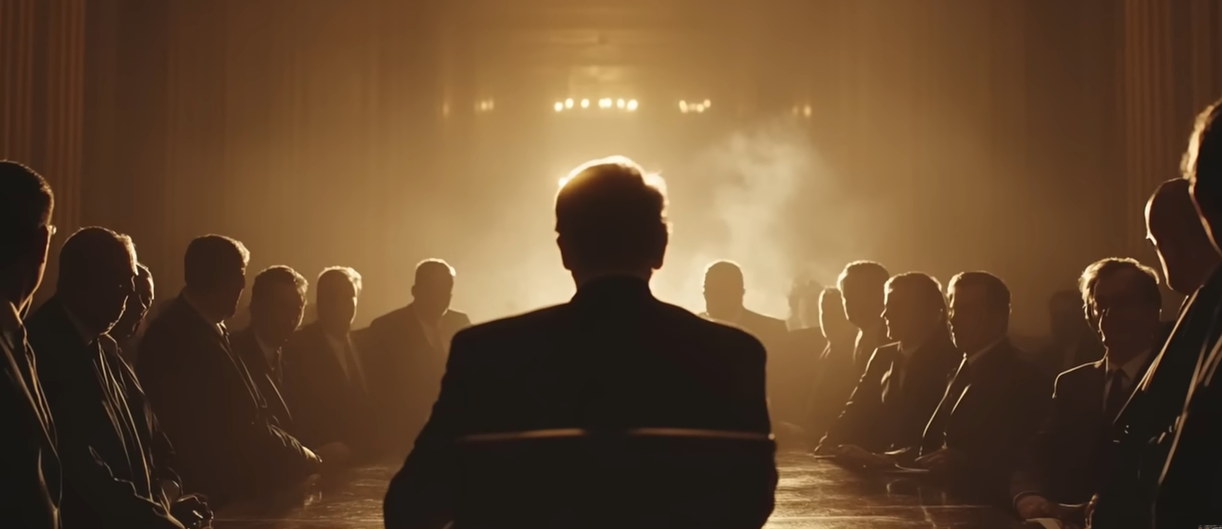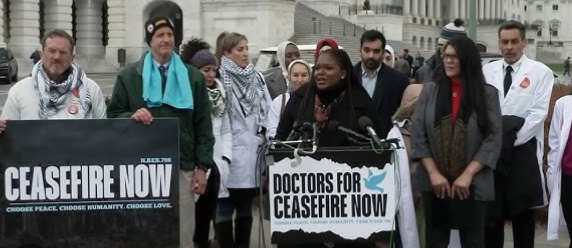Photos: Twitter\Harvard\YouTube
When Politico (5/2/22) published a leaked draft Supreme Court opinion that would, if handed down by the Court, overturn Roe v. Wade and undermine the foundation for many privacy rights enjoyed by Americans today, it was a headline story across US news outlets. But in the flood of coverage, too many elite media outlets focused on the leak itself and treated the issue as a political football, rather than centering the real-world implications the opinion would have for everyday people.

On NBC Nightly News (5/3/22), for instance, anchor Lester Holt turned first to Justice correspondent Pete Williams to explain what happened. Williams began by offering viewers his take: “While the publication of the draft is a shock, the conclusion of the draft shouldn’t be.”
Though most court observers did expect the conservative super-majority to overturn Roe (CounterSpin, 9/15/21), Alito’s conclusion—that not only was Roe “egregiously wrong,” but that “unenumerated rights” to privacy or autonomy in general have no constitutional grounding—was, in fact, shocking to many of those who analyzed it (e.g., Slate, 5/2/22). And just because something is anticipated doesn’t mean it’s not still shocking.
But with that framing, it was little surprise that the first expert Williams turned to for commentary, Tom Goldstein of SCOTUS Blog, spoke only of the gravity of the leak. (“This has never happened in American history. And the Court may never be the same when it comes to the trust between the justices and all of their law clerks.”)
Holt’s only question to Williams had a similar focus: “Pete, let me ask you. How does the Court plan to proceed in investigating this leak?”
‘Shocking breach of privacy’
CBS Evening News (5/3/22) likewise led off its coverage with its chief legal correspondent, Jan Crawford, who explained:
This is really a shocking breach of privacy, something that didn’t even happen when the presidency was on the line in Bush vs. Gore. It raises questions about how this Court will ever recover and what that final decision will be.
The irony of worrying about the Court’s privacy as it contemplates eliminating a right to privacy for all Americans was not addressed. Crawford later characterized the leak as a “body blow to the Supreme Court.”
Williams and Crawford are legal correspondents, so it’s perhaps logical that their focus centers on repercussions for the Court rather than for the general public. But this highlights the trouble with Washington reporting, which prioritizes inside baseball over real-world impact, allowing outlets to tout their professionalism and access with little danger of appearing partisan—or of giving the public the information it needs.
The rarefied focus also played into the right-wing framing of the story, which unsurprisingly cast the leak itself as far more important than the opinion’s implications for people seeking to end unwanted pregnancies. At FoxNews.com (5/3/22), Alito’s majority draft opinion “elicited shock from longtime observers of the Court,” not because of the potential elimination of a fundamental right to bodily autonomy, or the anticipated overthrowing of a 50-year-old precedent, but because the Court “rarely had information about its deliberations leak to the public.”
Notably, none of these networks mustered similar outrage over revelations about Justice Clarence Thomas’s wife Ginni repeatedly urging the White House chief of staff to illegally overturn the 2020 election results, and Justice Thomas’s refusal to recuse himself from cases related to January 6. In that case, all three newscasts framed the story as merely a partisan battle, with Democrats enraged and Republicans supportive of Thomas, rather than a “body blow” to the Court itself.

Impact on politics more than lives
Beyond examining the impact on the Court, the networks still often framed the Roe leak story in terms of politics rather than lives. In a segment introduced as exploring “how this could play out across the country,” NBC reporter Stephanie Gosk (5/3/22) concluded: “It is an issue that has long divided the country. And if Roe v. Wade is overturned, those divisions may grow deeper.”
Anchor David Muir on ABC World News Tonight (5/3/22) framed the story in his first segment foremost as a political football, saying that the leaked draft:
has certainly fueled both sides in this emotional debate, alarming millions who came to trust the 50-year-old right to privacy in making this choice as legal precedent and heartening millions of others who have fought to overturn Roe v. Wade for 50 years.
All the primetime shows did talk as well about the likely impact on those seeking abortions, which was almost always described as clinics or providers having more difficulty doing their jobs, or women having to travel farther to access abortions. Brief nods were occasionally made to the disproportionate impact on low-income and BIPOC communities (e.g., NBC 5/3/22), and the fact that “there’s already dwindling access that could quickly disappear” (CBS, 5/3/22). But what that would mean in practical terms—that more pregnant people will die and more families fall into poverty—was never directly stated.
Indeed, while NBC‘s Gosk interviewed leaders of abortion clinics in Texas and Mississippi, her sole question explicitly asking “what will happen to the women, many of them low-income, who every year get abortions in states like Mississippi, Texas, places like that?” was directed to the CEO of an anti-choice group, who assured viewers that they will be “providing them with holistic life-affirming options to make sure that they get access to the resources and the help that they need.” Gosk offered no counterpoint to that rosy view.
Pointless whodunnit
Much of the press was also fixated on the drama of who leaked the draft—a question of far greater interest to political insiders than to people contemplating a sharp curtailment of their rights. The right in particular devoted significant time to piecing together clues and determining what their motive might be, and, primarily, whether the leaker was liberal or conservative. One Fox piece, “Supreme Court Draft Decision Leaked to Energize Democrats’ Base, Former Clinton Adviser Says” (5/4/22), featured right-wing Democrat Mark Penn claiming Democrats initiated the stunt to bring suburban women voters back to the party: “I think that that breathed new life into Democratic hopes for those midterm elections.”
Right-wing outlet Newsmax host Grant Stinchfield (5/3/22) accused Kentaji Brown-Jackson—who is not yet on the Supreme Court, and thus does not have any access to their computers or documents—of leaking the draft.
With an investigation underway, such speculation and baseless accusations could easily go on for weeks, working to turn a story about a highly unpopular and undemocratic conservative move, one that strips people of a long-held and extraordinarily consequential right, into a pointless whodunnit. Corporate media have spent too long ceding the framing of the abortion story to the right and failing to show the devastating consequences the right’s decades-long attack on reproductive rights has already produced (FAIR.org, 5/19/21; CounterSpin, 5/28/21).
The essential story journalists need to be telling now is the story of the further concrete consequences the decision would have on millions of people’s lives throughout the country. Otherwise the real-life effects of a country without Roe are lost to the theatrical, sensational focus on the leak.






